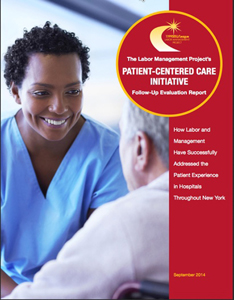When you first heard about patient-centered care, you might have wondered what it means and why it matters. You might even have wondered if it’s just the latest buzzword for something you’re already doing. After all, isn’t all the care we deliver patient-centered?
But providing patient-centered care means more than just being professional, proficient and compassionate. It means respecting individual choices and preferences as much as possible. It means improving communications among staff and between patients and staff. It means empowering both patients and staff so care can be more responsive to each individual patient’s preferences, needs, and values. And a new report from the Labor Management Project (LMP) shows that providing patient-centered care improves the patient experience—and satisfaction scores on that all-important HCAHPS survey.
The patient-centered care approach gained new urgency for hospitals when Medicare began to tie part of its hospital reimbursement rates to patient satisfaction scores on Hospital Consumer Assessment of Healthcare Providers and Systems (HCAHPS) surveys. That’s when the LMP launched its Patient Centered Care (PCC) initiative. The purpose of the PCC initiative, which began in 2011, was to improve patient satisfaction at participating hospitals. It includes a day-long training on topics such as healthcare reform, the patient experience, cultural competence, performance improvement, teamwork and relational coordination, and how to create a healing environment, as well as tools and approaches to improve the patient experience. To complement the training, the LMP provides technical support for performance improvement projects.
From April 2012 to December 2013, the LMP trained more than 3,000 1199SEIU service workers (e.g., housekeeping, transport, dietary, front-line clerical, CNAs, PCAs and PCTs) and supervisory staff across 19 hospitals in PCC and assisted in the facilitation of 16 performance improvement projects. The projects focused on increasing patient satisfaction by improving staff responsiveness, as measured by HCAHPS scores and use of call bells. The initiatives also involved engaging frontline workers and developing their skills and leadership.
Our recent evaluation showed improvements in participating hospitals’ patient experience scores after the performance improvement projects were implemented.
Report Results
The vast majority of PCC trainees reported that the training not only increased their awareness of patient satisfaction but also provided tools that allowed them to improve the patient experience at their hospitals. Quizzes completed before and after training demonstrated participants’ new knowledge of key themes. Participants reported increased awareness of the role they play in the patient experience, and more frequent use of tools such as AIDET and bracketing.
The performance improvement projects brought together staff and managers from different departments and disciplines to build leadership, relationships, and problem-solving skills, including many who had rarely before had such training opportunities because of the support or service roles they played. The training strongly conveyed the important role played by all staff in ensuring that the patient experience is excellent during a hospital stay. The LMP is expanding the PCC program, offering it to additional hospitals, expanding to ambulatory care centers, and addressing sustainability through train-the-trainer and technical support offerings.
Learn more
Download the report:
Read more about the success of our Patient Centered Care program and other labor-management partnership work.
